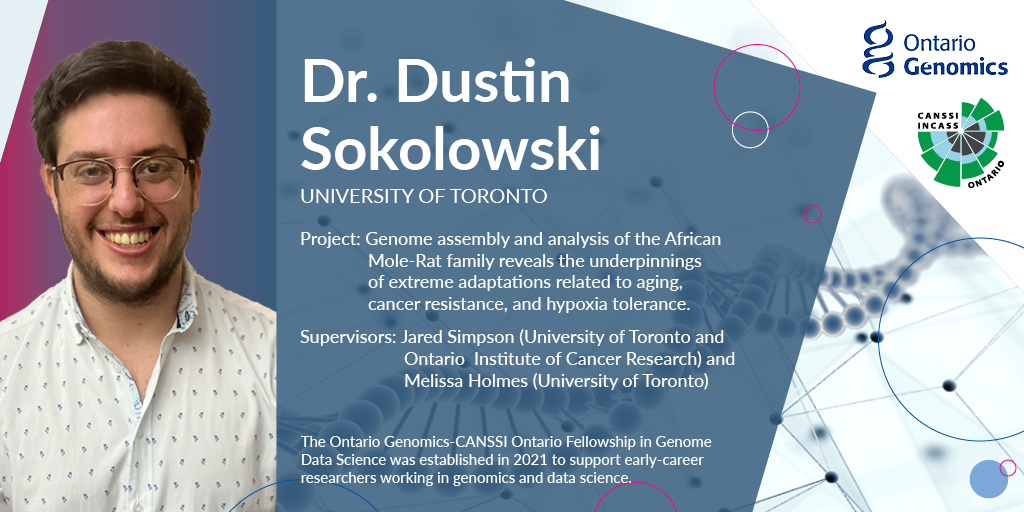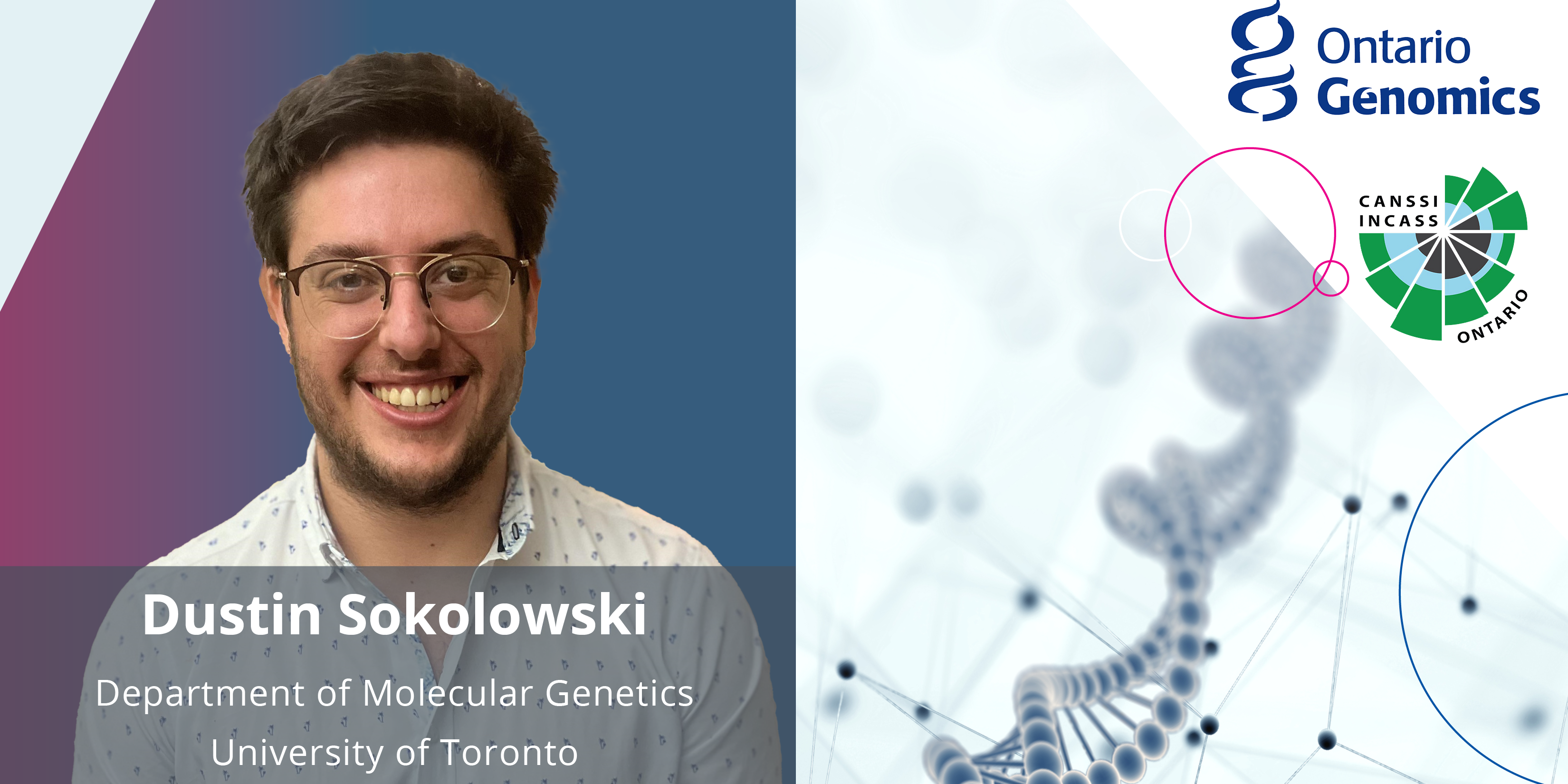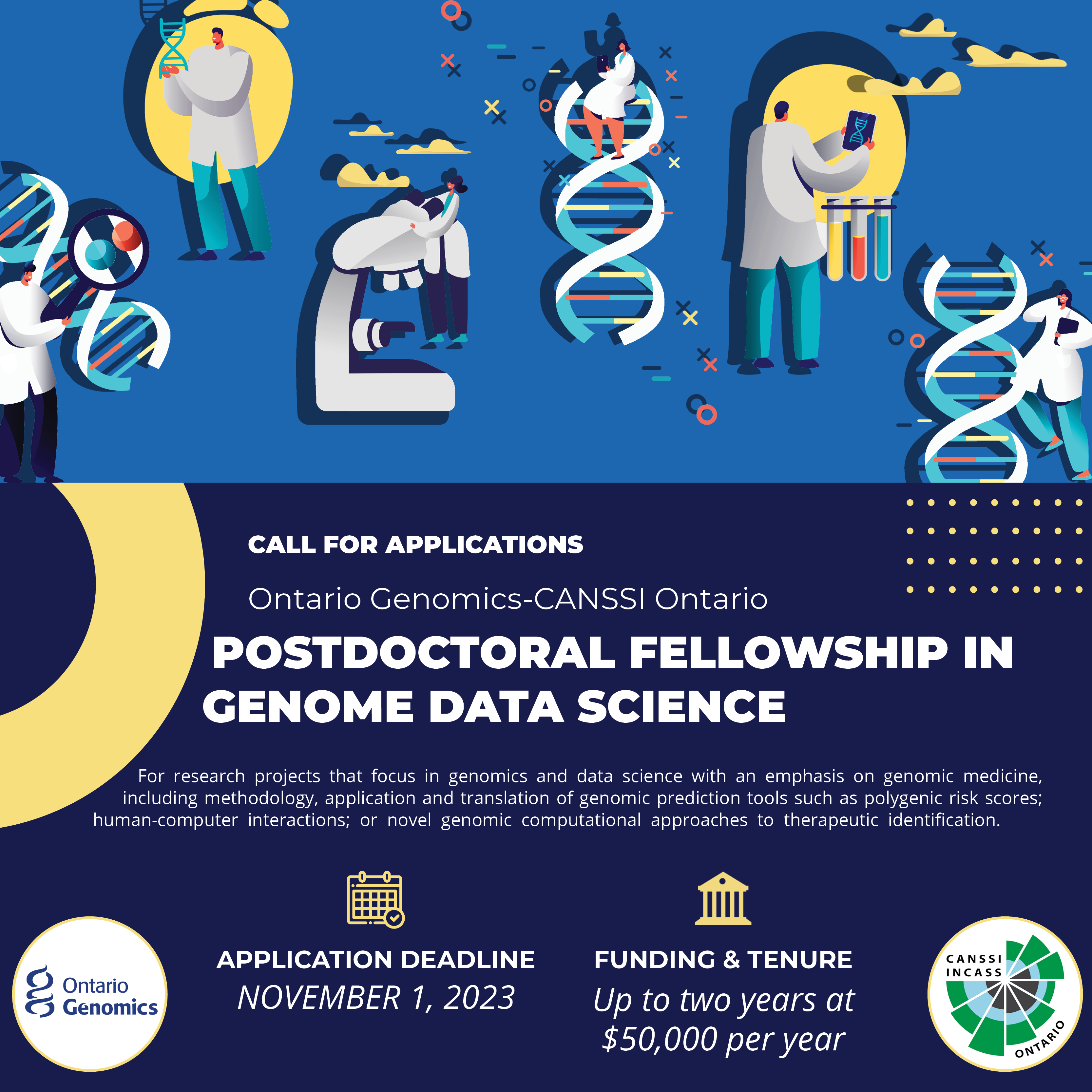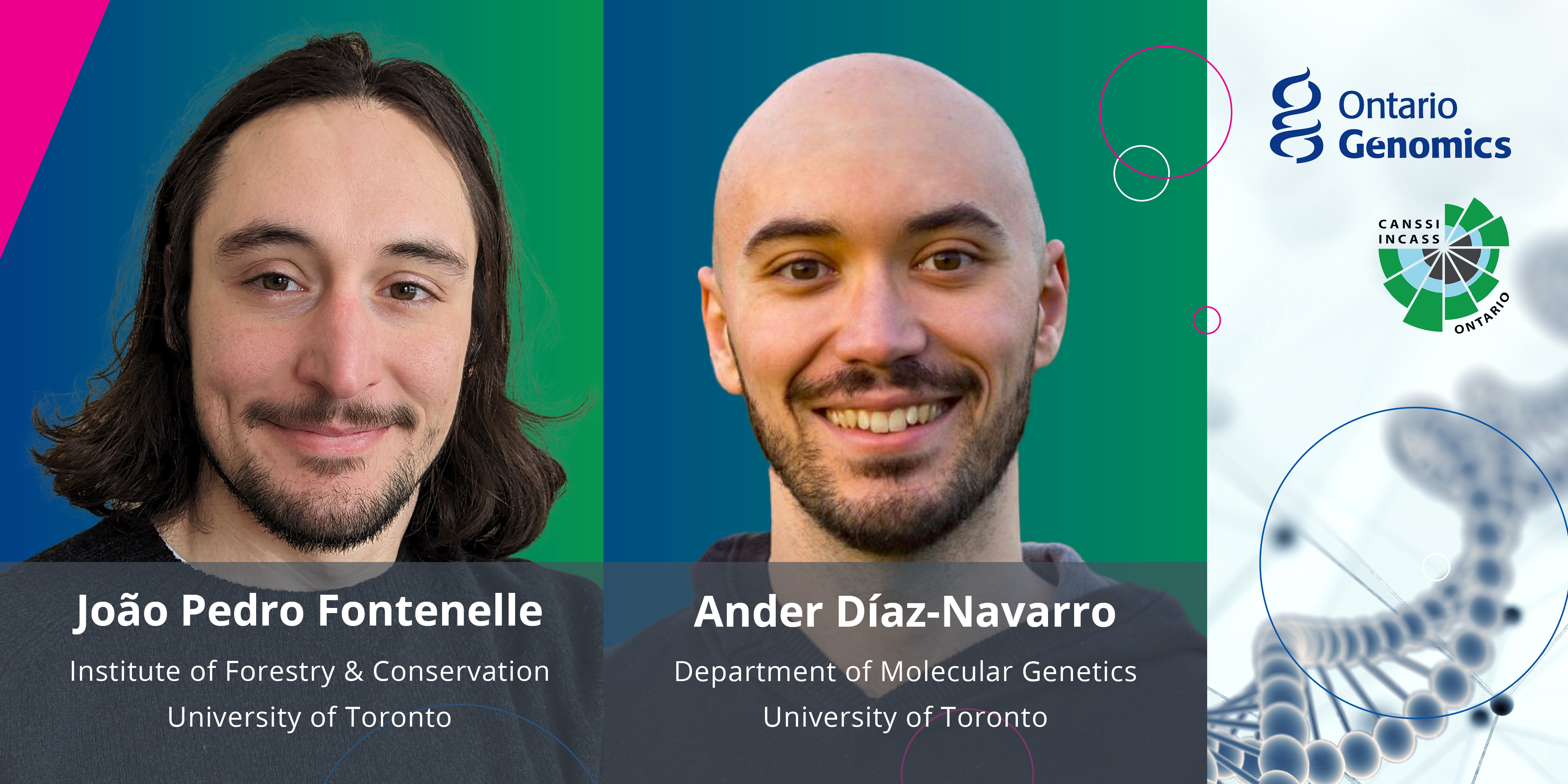Ontario Genomics-CANSSI Ontario Postdoctoral Fellowships in Genome Data Science
About
This Fellowship, now in its third year, will support the work of an early-career investigator pursuing research in the areas of genomics and data science with an emphasis on genomic medicine, including, but not limited to, methodology, application, and translation of genomic prediction tools such as polygenic risk scores; human-computer interactions; or novel genomic computational approaches to therapeutic identification.
Proposed projects should be innovative, generalizable across applications, and not restricted to developing a predictive tool for a single application.
The Fellowship offers two-year salary support for up to $50,000 CAD annually for postdoctoral fellows undertaking full-time research at a CANSSI Ontario partner university or their affiliated research institutes.
Candidates are responsible for selecting, contacting, and securing the commitment of two faculty members to jointly supervise them in their project, where at least one is a faculty member with a PhD in statistics, biostatistics, epidemiology, computational biology, genomics, or computer science. The second supervisor can be from any other field.
November 1, 2023, at 11:59 pm (ET)
Esther Berzunza, Program Manager, CANSSI Ontario
esther.berzunza@utoronto.ca
Michael Dorrington, Manager, Strategic Partnerships
mdorrington@ontariogenomics.ca
Applicants must be undertaking full-time research during the term of the postdoctoral fellowship at a CANSSI Ontario member university or any of their affiliated research institutes.
Applicants must fulfill or have fulfilled all degree requirements for a PhD in the fields of PhD in statistics, computational biology, biostatistics, bioinformatics, computer science, epidemiology, engineering, mathematics, or other related quantitative fields between January 1, 2021, and December 31, 2023.
The window of eligibility could be extended by a cumulative maximum of three years if the applicant had their career interrupted for extenuating circumstances, such as parental leave, illness, health-related family responsibilities, mandatory military service, disruptions due to war, civil conflicts and/or natural disasters in the country of residence, socio-economic reasons/lack of research opportunities, etc. It will only be extended by the duration of the eligible delay(s)/interruption(s).
Canadian citizens, permanent residents of Canada, and foreign citizens are eligible to apply provided that their proposed host institution is a CANSSI Ontario member university or any of their affiliated research institutes.
This Fellowship will support the methodological work of an early-career investigator pursuing research in the areas of genomics and data science with an emphasis on genomic medicine, including, but not limited to methodology, application and translation of genomic prediction tools such as polygenic risk scores; human-computer interactions; or novel genomic computational approaches to therapeutic identification.
Proposed projects should be innovative, generalizable across applications, and not restricted to developing a predictive tool for a single application.
Funding eligibility of submissions will be assessed based on scientific excellence and innovation by an adjudication panel.
Applicants are responsible for finding, contacting, and securing the commitment of two (2) mentors to jointly supervise them for the duration of the fellowship.
The two proposed supervisors must be from different academic divisions at a CANSSI Ontario member university or at their affiliated research institutes, where at least one is a faculty member with a PhD in statistics, biostatistics, epidemiology, computational biology, genomics, or computer science. The second supervisor can be from any other field. The expertise provided by the two supervisors should complement each other and provide the applicant with a broad perspective.
Both proposed supervisors must provide, in writing, their commitment to supervise and guide the research work of the candidate. Only PDF files will be accepted, with a maximum size of 2 MB per file.
Applicants must assemble all the following materials and documents and enter or upload them to the application form.
Applicants will need to provide the contact information of their two (2) proposed supervisors. Each supervisor will be contacted to complete and submit their letter of support online. It is the applicant’s responsibility to ensure that their application is complete and submitted online by the competition deadline.
- Summary of Proposed Research Project Length. Up to 6 letter-sized pages. 2.54 cm (1 inch) top, bottom, left, and right margins. 12-point Times New Roman, black font. Single-spaced. No condensed type or spacing. Single PDF file.
- Content. Using the following headings, describe the proposed research in enough detail to allow informed assessment by the adjudication committee members. This summary should be written in general scientific language.
- Proposed research background. Present, concisely, your project’s general objective(s) and its specific aims. If applicable, highlight how your objective pertains to combining 'omics data with other data to overcome challenges, especially as it applies to genomic medicine. Include the scientific background, significance, originality, and anticipated contribution to the advancement of knowledge; in other words, state what is the research problem, why this is an important research question, and why you are undertaking this project to address it.
- Methodology. Describe and justify, for each of your project’s specific aims, your choice of specific instruments, strategies, key activities, expected outcomes, and timelines, including, for example, methodological approaches and procedures for data collection and analysis. For a statistical research project, for example, provide an outline of the proposed theoretical and computational approaches and any specific techniques required to develop and evaluate proposed new analytic methods, including critical features in the design of simulation studies and in the application of the methods to available or anticipated study data. In other words, state why your proposed methodology is ideal to achieve each of your project’s specific aims. Include any ethical considerations, such as the requirement for Research Ethics Board approval.
- Supervisors and Roles. Describe how this project fits with ongoing work by the proposed supervisors and the roles of any collaborators in the project. Provide the rationale for selecting your proposed host institution and supervisors. Describe how the expertise of your two proposed supervisors complement each other and how, together, they will provide the right combination for the success of your research project and training.
- Candidate. Describe your role in the project and how it will prepare you for career goals in the field on genomic medicine. Explain the relationship and relevance of the proposed research to your long-term research goals. Describe how the proposed project relates to experiences and insights gained from earlier research experience.
Academic CV
Length: Up to 4 letter-sized pages. 2.54 cm (1 inch) top, bottom, left, and right margins. 12-point Times New Roman, black font. Single-spaced. No condensed type or spacing. Single PDF file.
The CV should include the following headings, as applicable:
- Name and Affiliation
- Work Experience
- Academic and Training Background
- Significant Accomplishments (in point form, indicate which are considered the applicant’s three to five most significant accomplishments, such as leadership roles, research achievements, applications of their research, influence on policy and practice, etc.)
- Selected Recognitions and Awards
- Selected Research Outputs (provide a link, where available), including, but not limited to:
- Selected peer-reviewed publications and preprints
- Selected datasets, software and research materials
- Selected inventions, patents and commercial activity
- Selected Research Funding
Letters
Provide three (3) letters as follows:
Letter of Support
One (1) joint letter of support from the proposed supervisors. This letter must be on institutional letterhead and signed by both supervisors.
The letter must include,
- a brief paragraph summarizing the supervisors’ research;
- a description of the fit between the supervisors’ and applicant’s research interests and how the applicant’s proposed research will complement the supervisors’ ongoing research aims;
- a clear commitment from the supervisors to support the applicant’s research and professional development. This includes mentorship, collaboration, access to resources, and development of leadership potential.
Letters of Reference
Two (2) letters of reference that provide insight into the applicant’s academic/research competence, written on official letterhead, if possible. These letters should be from current or past professors or supervisors, or other individuals with direct knowledge of the applicant’s work experience, academic performance, or scholarly potential. These letters should not be from the proposed supervisors.
Letter Requirements
Letters must not exceed two pages in length. Single PDF file. Size 1 MB.
A link will be emailed to the referees and proposed supervisors from the on-line application portal. The email will contain a link for them to upload their letter.
Applicants are responsible for contacting referees/proposed supervisors and for ensuring that they provide their letter of support by the application deadline.
Upon receipt of all materials and documents, including both letters of support from the two (2) proposed supervisors, an acknowledgement of receipt and completion will be emailed to the applicant.
Application form opens: July 12, 2023.
Application form closes: November 1, 2023.
Application evaluated: November 2-30, 2023.
Candidates and their mentors are emailed the decision: Weeks of December 5 and 12, 2023.
Release of results: Weeks of December 15 and 22, 2023.
Only candidates who accept the offer will be posted on the CANSSI Ontario and Ontario Genomics websites.
Applications will be evaluated and awardee(s) selected by an adjudication panel.
Funding decisions will be disclosed to each applicant and their supervisors by email. The name of the successful applicant will be publicly announced on the CANSSI Ontario and Ontario Genomics websites, newsletters and social media channels.




